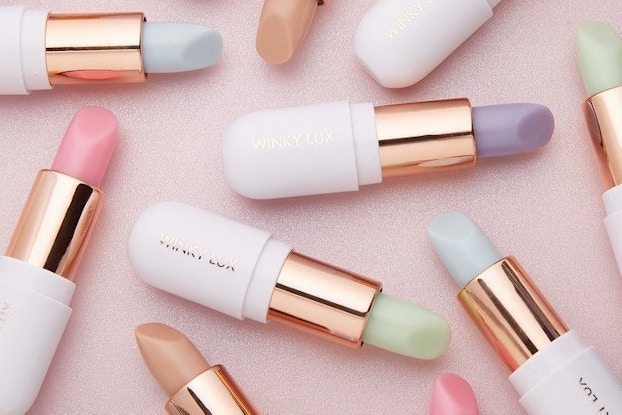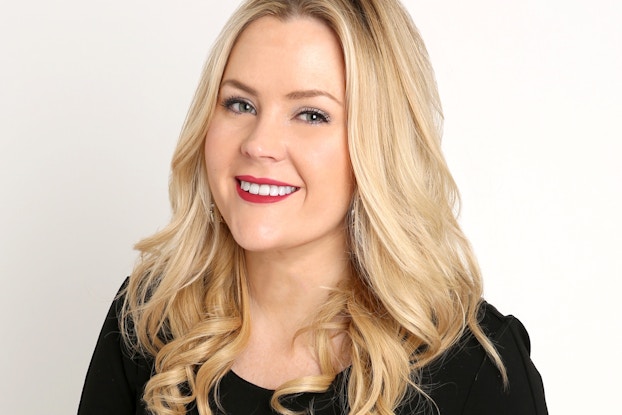
“Our mission statement is to create joy,” said Natalie Mackey, the convivial co-founder of startup beauty brand Winky Lux. Joy is apparently the common ingredient in every product, package and message — even the silhouette of a pink standard poodle that serves as a mascot is designed to elicit smiles. “So, we use that as our purpose filter for everything that we produce.”
That mission seemed to resonate from the time the brand launched in 2015, particularly with Gen Z customers who were seeking cruelty-free, clean beauty products made without harmful parabens, phthalates and sulfates.
Winky Lux surged to profitability this year, going from bootstrapped startup to more than $20 million in sales through retail partnerships at Sephora, Macy’s, Ulta, Amazon and Nordstrom, as well as direct to consumers via e-commerce and two brick-and-mortar stores in New York City and Nashville.
What Mackey couldn’t have predicted was that the timing of Winky Lux’s Target debut in early March would prove to be a stroke of luck despite the fact that the pandemic shuttered all but the most essential retail.
Among stores like Target that remained open, the experience was reduced from fun to functional practically overnight. Who wants to browse when lingering could expose you to the virus, and all you need is toilet paper (if you can find it) and toothpaste?
Target launch proves pivotal amid pandemic
The Winky Lux/Target partnership was in the works in 2019 and set to launch later in the spring of 2020. Yet Target asked to push up the date “because of some operational things,” Mackey said. So, the bright floral and fuchsia neon-splashed displays landed just around the time when major cities around the country began to mandate shelter in place and quarantine orders, with exceptions only for essential retail.
It’s true that many consumers flocked to e-commerce as COVID-19 took hold, said Larissa Jensen, beauty industry advisor at The NPD Group.
As stores closed, consumers flocked online, with direct-to-consumer (DTC) beauty brands performing better than prestige lines during and after lockdown in the U.S., according to data from NPD's Innovation Lab.
The pandemic could have spelled a severe stalling of sales for Winky Lux. Although it had built a loyal following, Winky Lux, like many other beauty brands, rely on people trying on the product and seeing the colors in person to gain new customers.
I've always been about this, like, joyful self-care and I don't know a time when we've ever needed it more.Natalie Mackey, co-founder, Winky Lux
Sales strategy
If the pandemic has prompted you to reconsider your business's sales strategy, read on for more business owners who found themselves in the same boat.
While Winky Lux’s own stores shut along with Sephora and Ulta, and department store partners Nordstrom and Macy’s followed suit, Target would prove to be the bridge for consumers to discover the products just from wandering the aisles. Indeed, Mackey said that she’s noticed an uptick in the age of its typical buyer, as more shoppers find Winky Lux as they’re browsing for groceries and other goods at Target.
Mackey didn’t offer specific numbers but did say that sales were “way above” projections. For its part, Target Corp. logged record sales in the second quarter, with comparable store sales up over 24%.
The owned supply-chain edge
Amid the pandemic, brands have faced the challenge of getting their products on retail store shelves, with factories closed or operating at drastically reduced capacity.
In another strategy that proved to be prescient, Mackey said that Winky Lux manages its own supply chain. “It's not unheard of,” she said, “but it's not the typical norm in beauty.”
Winky Lux even controls its raw materials, like the little flowers that go inside the Flower Balm lip balm, and a liquified diamond powder that goes into its foundation. It takes more people to manage the processes and the technology, Mackey said, “but it does allow for much better speed.”
Time was of the essence when it became clear that hand sanitizer was quickly becoming the go-to product of the pandemic. “We always knew one of our factories was able to make hand sanitizers,” she said. So in March and April, every customer got a free “Spritzer” along with whatever else they bought. “Instead of doing our normal ‘surprise and delight’ [giveaway] which might be like a pin or stickers or a little sample, we just shifted everything to these little bottles of hand sanitizer,” she said. Now, customers who spend over $30 will get a free one and Winky Lux does a one-for-one donation to an essential worker, as well.

That wasn’t Winky Lux’s only pivot during the pandemic. Mackey seized on the idea that even when working remotely, people want to look good on video calls, so the brand developed a limited edition lipstick called WFH (no longer available). Mackey said the blue-pink tone was universally flattering and really popped on screen, “which was just sort of like a joyful way to approach a weird time.”
Of course, all is not neon pink and roses, and Mackey confessed that there are headwinds. Consumer spending could decline if the economy shrinks further and unemployment rises again if the rate of COVID cases continues to increase across the country. And who will keep investing in new makeup when there aren’t offices to report to each day, and events are few and far between?
And while lipstick was long considered a recession-proof product (as dubbed by Estee Lauder’s Leonard Lauder after 9/11), that theory is now in question. The pandemic means people are covering their faces when venturing out, so no one can see their lipstick shade, she said. However, Mackey observed that eye makeup seems to be displacing lipstick as the item customers are buying more of as the pandemic wears on. “Mascara for the mask era,” she quipped.
Buoyed by ‘healthy’ profit margins and ‘bullish’ on the future
Based on Winky Lux’s current sales and “healthy” profit margins which boosted the company to profitability for the first time this year, Mackey said she’s “bullish” about the future.
“We felt like there was a place in the market for stuff that felt really beautiful, that looks very luxurious, that people would be proud to have in their bag,” she points out. “I think we've hit that sweet spot of being able to offer the cleaner ingredient profile, which does cost a little bit more, but also having an accessible price point.” Every Winky Lux item sells for less than $30, and most of its 100 products are actually below $20 — a fitting price point for injecting a bit of joy into those impulse buys on days when you’re just running in to grab shampoo or soda.
That goes for customers of any generation, said Mackey. “I think that the value proposition of joy is a really ageless one,” she said, “Not that we're trying to be everything to everybody.” But she’s unabashedly optimistic about 2020. “This year is still going to be a huge year for us. I think that we’ve got the right message right now,” she said, “I've always been about this, like, joyful self-care and I don't know a time when we've ever needed it more.”
CO— aims to bring you inspiration from leading respected experts. However, before making any business decision, you should consult a professional who can advise you based on your individual situation.
Follow us on Instagram for more expert tips & business owners stories.
CO—is committed to helping you start, run and grow your small business. Learn more about the benefits of small business membership in the U.S. Chamber of Commerce, here.







